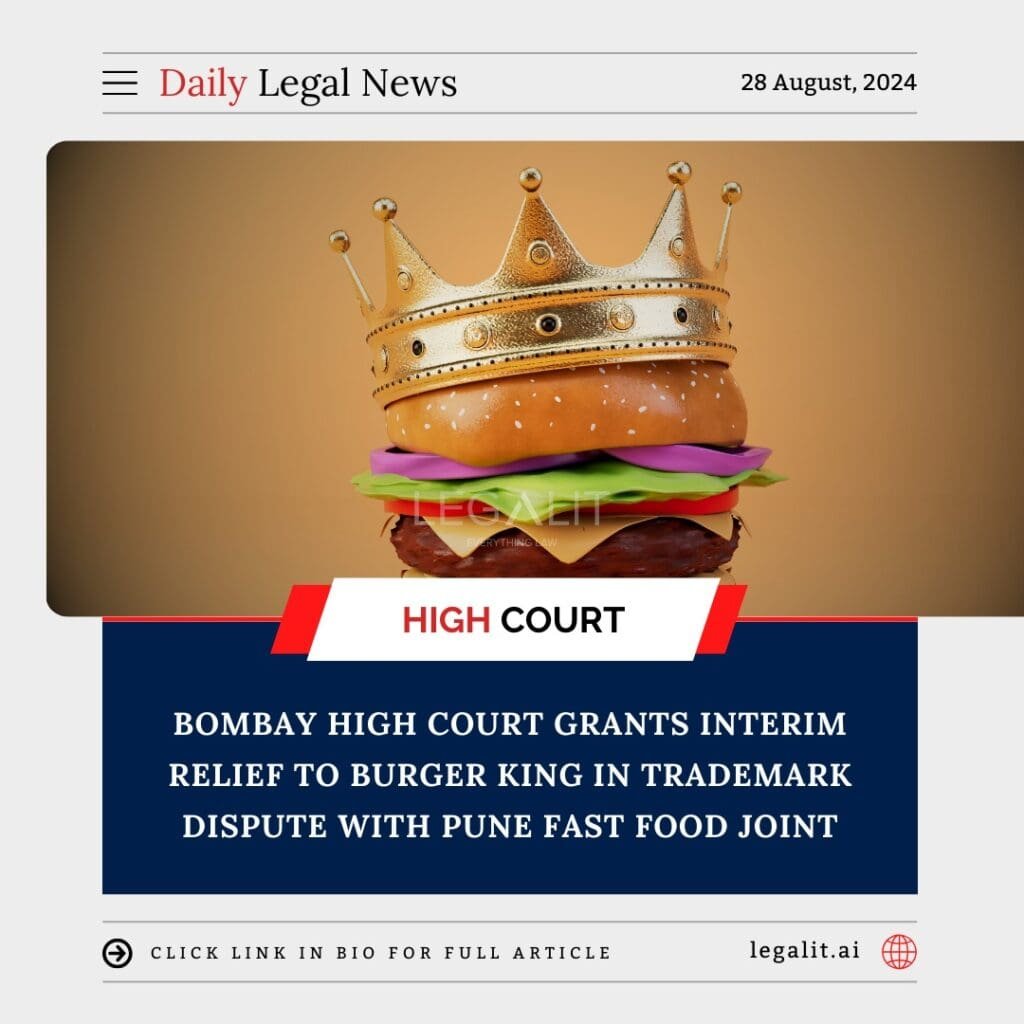
In a significant development in trademark law, the Bombay High Court has granted interim relief to the global fast-food giant, Burger King, in its ongoing legal battle against a Pune-based fast food joint. The court’s decision temporarily restrains the Pune establishment from using a name or branding that closely resembles Burger King’s registered trademarks, marking a crucial step in the protection of intellectual property rights in India.
Background of the Case:
- Trademark Infringement Allegations: Burger King, known for its iconic branding and global presence, filed a lawsuit against the Pune fast food joint, alleging that the latter’s name and branding were deceptively similar to its own. The lawsuit claimed that this similarity could confuse consumers, dilute the Burger King brand, and unfairly benefit the Pune joint by capitalizing on Burger King’s established reputation.
- The Importance of Trademark Protection: Trademarks are a vital aspect of a company’s identity, representing its brand value, reputation, and goodwill in the market. Infringement on these trademarks can lead to consumer confusion, loss of business, and damage to the brand’s reputation. Companies like Burger King invest heavily in building and protecting their trademarks to maintain their market position and consumer trust.
Key Points from the High Court’s Ruling:
- Granting of Interim Relief: The Bombay High Court’s interim order restrains the Pune fast food joint from using any name, logo, or branding that resembles Burger King’s trademarks until the final resolution of the case. This interim relief is a significant victory for Burger King, as it prevents further potential damage to its brand while the case is ongoing.
- Legal Standards for Trademark Infringement: In granting interim relief, the court considered whether Burger King had a prima facie case of trademark infringement. The court found that the similarities between the branding of the two businesses were likely to cause confusion among consumers, which is a key consideration in trademark disputes. The court’s decision underscores the importance of protecting well-known trademarks from imitation, especially when it could lead to consumer deception.
- Balancing Interests: While the court granted relief to Burger King, it also balanced the interests of the Pune joint by limiting the relief to an interim measure. The final decision in the case will depend on a thorough examination of the evidence and arguments presented by both parties. This approach ensures that the case is resolved fairly, with both parties having the opportunity to present their case.
Implications for Trademark Law and Businesses:
- Strengthening Trademark Protections: The Bombay High Court’s decision reinforces the importance of trademark protections in India. It sends a clear message that the judiciary is committed to upholding the rights of trademark owners, particularly well-established global brands, against infringement. This is likely to encourage more businesses to take legal action to protect their intellectual property rights.
- Impact on Small Businesses: While the ruling is a victory for Burger King, it also highlights the challenges faced by small businesses in navigating trademark laws. The case serves as a reminder that even small or local businesses must be cautious when choosing branding and trademarks, ensuring they do not infringe on the rights of larger, established companies. This may lead to increased diligence in brand development and legal compliance among small businesses.
- Consumer Protection: The case also underscores the role of trademark law in protecting consumers. By preventing businesses from using confusingly similar trademarks, the law helps ensure that consumers can make informed choices without being misled. This maintains trust in the market and supports fair competition.
Conclusion:
The Bombay High Court’s decision to grant interim relief to Burger King in its trademark dispute with a Pune fast food joint is a pivotal moment in the ongoing enforcement of trademark rights in India. The ruling not only protects the interests of a global brand but also serves as a crucial precedent in trademark law, emphasizing the need for businesses of all sizes to respect intellectual property rights.
As the case progresses, it will be closely watched by legal professionals, businesses, and consumers alike, as it could have significant implications for trademark enforcement in India. The outcome of the final ruling will further clarify the standards for trademark protection and the balance between protecting brand identity and allowing market competition.